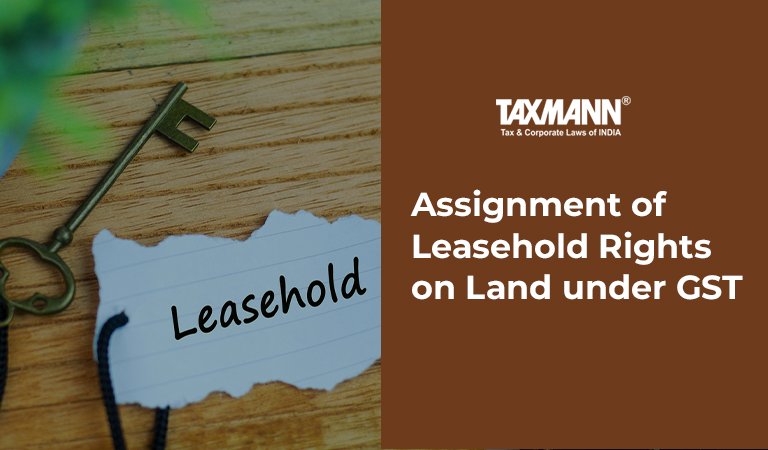Assignment of Leasehold Rights on Land under GST
- Blog|News|GST & Customs|
- 5 Min Read
- By Taxmann
- |
- Last Updated on 27 May, 2022

Shubham Khaitan – [2022] 138 taxmann.com 453 (Article)
Introduction
Coverage within the definition of supply under Section 7(1)
Exclusion from the ambit of supply
Leasehold rights as benefit arising out of land
As per the Registration Act 1880:“immovable Property” includes land, buildings, hereditary allowances, rights to ways, lights, ferries, fisheries or any other benefit to arise out of land, and things attached to the earth, or permanently fastened to anything which is attached to the earth, but not standing timber, growing crops nor grass
As per the General Clauses Act 1897:“Immovable property’ shall include land, benefits to arise out of land, and things attached to the earth or permanently fastened to anything attached to the earth”.
As per Section 3(a) of Land Acquisition Act, 1894:The expression ‘land’ includes benefits that arise out of land and things attached to earth or permanently fastened to anything attached to the earth”
As per Section 3(4) of Bombay Land Revenue Code, 1879:‘land’ includes benefits to arise out of land and things attached to the earth or permanently fastened to anything attached to the earth and also shares in or charges on the revenue or rent of village or other defined portions of territory”
Long term lease equivalent to sale?
“Admittedly, substantial part of the demand against the appellant in various proceedings, relate to their Service Tax liability on lump-sum premium amount, received by them from the allottees on allotment of land on long term basis. In view of the introduction of new Section 104 in the Finance Act, 1994 the appellant’s liability on such consideration no longer exists. The one-time payment received for grant of long term lease of 30 years or more of industrial plot, is not liable to Service Tax for all the periods covered in the present proceedings. However, we hold that the appellants are liable to pay Service Tax in respect of such one-time amounts received in respect of lease granted for less than 30 years.The appellants are liable to Service Tax on the activity of leasing of land, for use in the furtherance of commerce or business, from 1-7-2010. However, considerations received as lump-sum upfront payment in respect of lease of land for a period of 30 years and above shall not be liable to such tax;”
Click Here To Read The Full Article
Disclaimer: The content/information published on the website is only for general information of the user and shall not be construed as legal advice. While the Taxmann has exercised reasonable efforts to ensure the veracity of information/content published, Taxmann shall be under no liability in any manner whatsoever for incorrect information, if any.

Taxmann Publications has a dedicated in-house Research & Editorial Team. This team consists of a team of Chartered Accountants, Company Secretaries, and Lawyers. This team works under the guidance and supervision of editor-in-chief Mr Rakesh Bhargava.
The Research and Editorial Team is responsible for developing reliable and accurate content for the readers. The team follows the six-sigma approach to achieve the benchmark of zero error in its publications and research platforms. The team ensures that the following publication guidelines are thoroughly followed while developing the content:
- The statutory material is obtained only from the authorized and reliable sources
- All the latest developments in the judicial and legislative fields are covered
- Prepare the analytical write-ups on current, controversial, and important issues to help the readers to understand the concept and its implications
- Every content published by Taxmann is complete, accurate and lucid
- All evidence-based statements are supported with proper reference to Section, Circular No., Notification No. or citations
- The golden rules of grammar, style and consistency are thoroughly followed
- Font and size that’s easy to read and remain consistent across all imprint and digital publications are applied



 CA | CS | CMA
CA | CS | CMA

There is lots of confusion on this issue , you have made an attempt by discussing the basis as to the definition of assets ..good